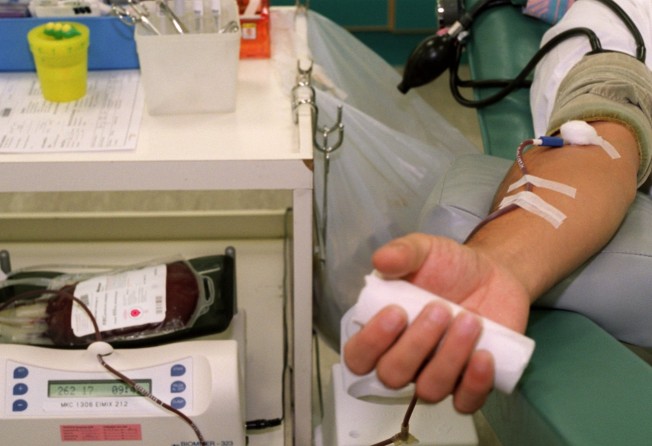Ban on donations from gay men could be eased, Red Cross Blood Transfusion Service says
Statement comes after protest by Christian student group at Sunday event

The Hong Kong Red Cross’ Blood Transfusion Service will look into possibly changing the policy that prevents gay men from giving blood for the rest of their lives.
The statement came hours after a Christian student group called on BTS, the city’s only blood provider for all hospitals, to ease the ban on Sunday, saying that HIV infections were due mostly to unsafe sex and had nothing to do with the gender of the donors’ sexual partners.
During their protest at a Red Cross event on Sunday afternoon, the Student Christian Movement of Hong Kong said the policy was not fair or reasonable to homosexual men, who they proposed should be allowed to give blood as long as they had not had unsafe sex for three months before donating.
Ko Chung-lai, from the student group, said the Red Cross could refer to similar policies by their overseas counterparts.
“Let’s say Japan, it is one year [of not having unsafe sex]; it is also one year in the US … we hope that the Red Cross can keep abreast of the times,” Ko said.
In response, Blood Transfusion Service chief executive and medical director Dr Lee Cheuk-kwong said such policy changes had been noted.
“We’ve actually been watching the situation closely and communicating with different stakeholders.”
In its statement, the service said the expert panel on blood and blood products safety under the Hospital Authority, which managed the service, had been regularly reviewing the questions in a health check questionnaire for donors.
The form includes questions for male donors on whether they have performed sexual activities with another man. Under current policy, those who have engaged in male-to-male sex are “permanently deferred” – in other words, screened out.
The service said it was aware that some countries or regions had started to discuss or to make changes in the permanent deferral policy. Such changes should be based on scientific data, with blood safety as the prime consideration, it added.
“The BTS has been meeting different bodies in society over the past two years and will continue to communicate with all stakeholders [on the issue],” the statement said.